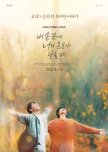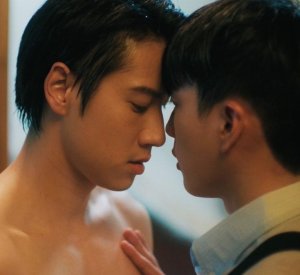
Deze recentie kan spoilers bevatten
They served drama, chaos, and bromance... and I’m not over it.
High School Frenemy had all the ingredients for an unforgettable school drama—rival campuses, broken friendships, and just enough tension to keep you hooked. And let me tell you, this show ate and left no crumbs.Saint and Shin? Absolute icons. Their whole “we used to be besties but now we’re enemies” vibe is straight-up fire. Saint’s got that brooding, too-cool-for-school energy, while Shin is all sass and rage, and the way they clash is chef’s kiss. The tension? Off the charts. You’ll be yelling at your screen one minute and clutching your chest the next because the feels are real.
And don’t even get me started on the side characters—they understood the assignment. Chadjen’s quiet wholesomeness, Ken and the twins always bringing some trouble (but being good at heart), and the rest of their classmates add so much depth. These aren’t just background extras; they’re out here serving personality and adding layers to the story. Even the teachers, Ms. Jan and Mr. Sung, are low-key MVPs. They’re like the glue holding the chaos together—strict when they need to be but always rooting for their students in the most genuine way.
Now, let’s talk music because wow. The soundtrack? Straight bangers. It’s like the perfect playlist for every mood—heartbreak, rage, nostalgia—you name it. Whoever put it together deserves a raise because it hits every time.
And that ending? Ugh, so satisfying. It doesn’t give you all the answers on a silver platter, but it ties up just enough to make you feel things while still leaving you thinking about it days later.
High School Frenemy isn’t just a show; it’s a whole moment. It’s got drama, vibes, and a ton of heart. If you’re not watching it, what are you even doing? Stop sleeping on this gem and get ready to be obsessed.
Vond je deze recentie nuttig?

Deze recentie kan spoilers bevatten
they really went all and above yet they give us nothing
This drama had so much potential, but honestly, it left me feeling a bit empty. The story of Ho Tae and Dong Hui was super emotional—a mix of grief, abuse, and confusing feelings—and it could’ve hit really hard, but it just didn’t deliver.The setup is solid: Ho Tae comes back to his hometown after his dad's funeral, and Dong Hui, who's been through hell with his own dad, is already living in Ho Tae’s house. They’re practically family, but there’s this underlying tension because Dong Hui’s feelings for Ho Tae go beyond brotherly love. The way they try to keep things “normal” is so relatable, especially when you’re young and don’t really know how to deal with emotions that feel so huge.
What really stood out to me was how different the two are. Dong Hui is outgoing and has a thing for swimming, but deep down, he’s so fragile. Ho Tae is quieter, into drawing, and kind of a loner. Watching them navigate this weird mix of being close but not too close felt very real—like they wanted to hold on to their childhood bond but couldn’t ignore that things were changing.
But here’s the thing: the pacing felt off, and the ending? It gave us nothing. One of them ends up with a broken leg, losing his dream, and the other goes off to college in another city. Then suddenly, they’re just… at the beach again, like nothing happened. That beach was such a big part of their story, but the way they brought it back felt more like a shrug than a real conclusion.
I really wanted more. More closure, more clarity on what they actually mean to each other. The whole “we’re brothers but maybe something else” vibe was so raw and interesting, but it just kind of fizzled out. It’s like the drama was scared to commit, and that’s disappointing because the emotional buildup was there.
Overall, The Time of Fever is great at creating feelings—grief, tension, longing—but it doesn’t know what to do with them. You’ll probably feel something while watching, but don’t expect to walk away satisfied.
Vond je deze recentie nuttig?

Deze recentie kan spoilers bevatten
when love leaves you, but loneliness stays
This drama? It’s not just a story—it’s an emotional gut-punch from start to finish. From the very first scene, it pulls you into Ko Yeong’s messy, heartbreaking life. He’s the guy who’s always out, chasing the nightlife—bars, dancing, drinking, and one-night stands. On the surface, he’s carefree and fun, but deep down? He’s terrified of being alone. His life feels like this endless loop of trying to drown out the silence, and it’s painful to watch because you can tell he’s running from something he can’t escape.Let’s address the elephant in the room: Ko Yeong is a walking contradiction. He craves connection but pushes people away. He wants love but fears what comes with it. It’s like he’s caught in this perpetual tug-of-war between what he needs and what he thinks he deserves.
And isn’t it funny how the grass is always greener on the other side? He surrounds himself with noise, people, and distractions, hoping it’ll fill the void, but you can tell he’s longing for something quieter—something real. Yet, when he gets close to it, he bolts. Fear of commitment, fear of rejection, fear of being seen for who he really is—it’s all wrapped up in the way he navigates relationships.
His parents’ messy divorce didn’t do him any favors, leaving him with a skewed idea of what love looks like. Add Kylie—his nickname for HIV—into the mix, and it’s no wonder he struggles to let people in. Kylie isn’t just a condition for Ko Yeong; it’s a shadow that follows him everywhere, whispering that he’s not worthy of love or stability.
Mi Ae, his roommate and best friend, is like his emotional anchor. She’s the one constant in his life, the person who knows him better than anyone else. But let’s not sugarcoat it—anchors don’t float. When she gets married and moves on, Ko Yeong is left to sink or swim. Spoiler: he starts sinking.
Then there are his relationships. Nam Gyu, bless his old-soul heart, was a shot at something tender and genuine. But Ko Yeong wasn’t ready, and Nam Gyu’s tragic end only adds another layer of guilt to Ko Yeong’s already complicated life. Then there’s Youngso, who deserves a medal for Worst Human Ever. He uses Ko Yeong, hides their relationship, and has the audacity to call homosexuality a sin. The betrayal cuts deep, and you can feel how it makes Ko Yeong retreat even further into himself.
And finally, Gyu Ho—the love that could’ve been the love. Their relationship starts off sweet, almost hopeful, like maybe this time it’ll work out. But life doesn’t work that way, does it? The spark dims, the fights start, and the weight of reality crushes them both. Even their trip to Thailand, a place meant to rekindle their connection, is overshadowed by Kylie and all the baggage that comes with it.
Here’s the kicker: Ko Yeong’s life isn’t about grand epiphanies or neatly tied-up endings. It’s about the slow, painful crawl toward understanding yourself. After Gyu Ho leaves for China, Ko Yeong throws himself into writing. It’s his way of processing, of making sense of the mess. But even when he revisits Thailand with someone new, it’s clear he’s still haunted by what he lost.
Love in the Big City doesn’t hand you closure on a silver platter. It’s raw, messy, and brutally honest. It captures the discomfort of being stuck between who you are and who the world expects you to be. It’s a reminder that love, no matter how fleeting or complicated, leaves its mark. And sometimes? The grass isn’t greener—it’s just a different shade of heartbreak.
Heartbreaking, unforgettable, and absolutely worth the emotional wreckage. Watch it. Feel it. Then sit with it, because it’s the kind of story that stays with you, whether you like it or not.
Vond je deze recentie nuttig?







